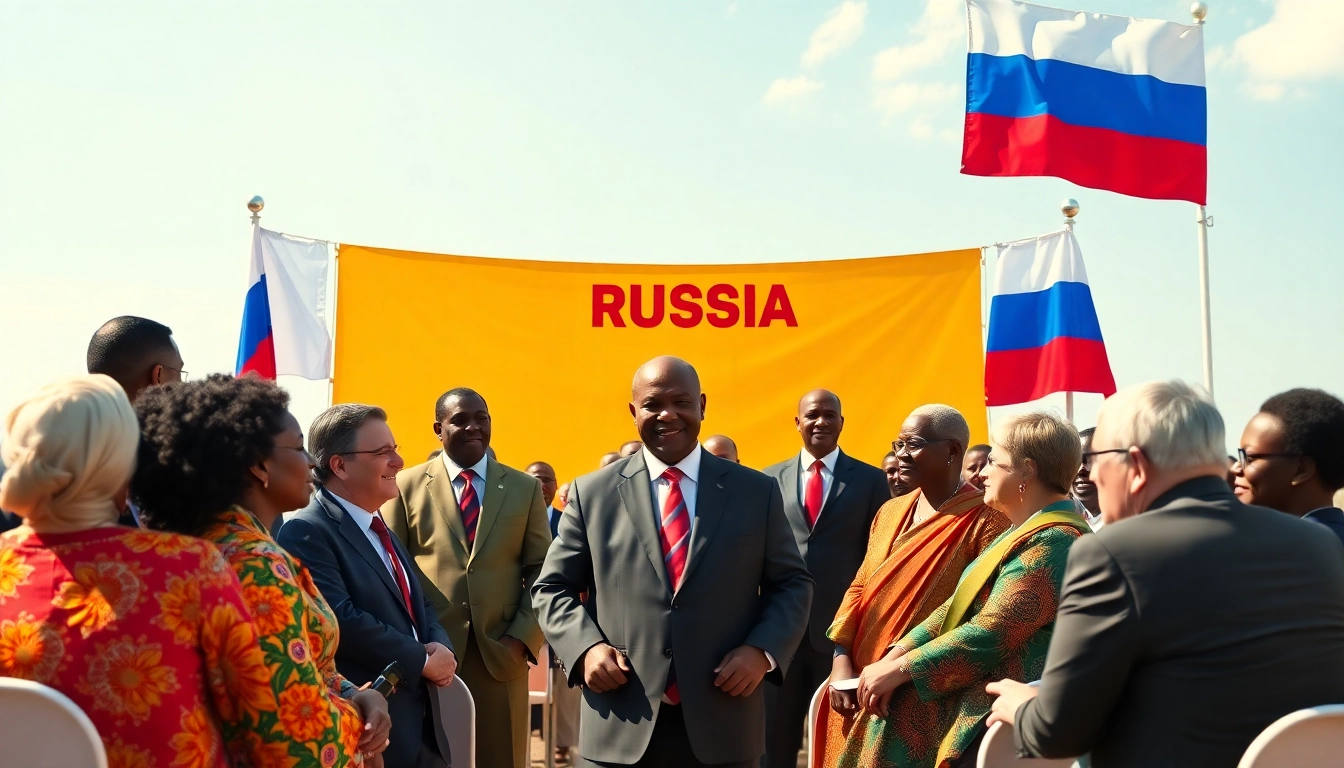The Rise of Russia in Africa 2025: An Overview
The year 2025 is shaping up to be a significant milestone in the context of global alliances, particularly with the increasing influence of Russia in Africa. The relationship between Russia and Africa has evolved over decades, moving from a background role during the Cold War to a more proactive and strategic partnership in various sectors. Today, as geopolitical dynamics shift, many African nations view Russia in Africa 2025 as a critical player in shaping their future, aiming for greater agency and self-determination in international relations.
Historical Context of Russian-African Relations
Understanding the present requires knowledge of the past. Russia’s initial interest in Africa dates back to its Soviet era, where it sought to expand its influence through support for anti-imperialist movements. While many African countries were gaining independence, the USSR positioned itself as a counterbalance to Western hegemony, providing military and economic aid to numerous nations. This historical foundation laid the groundwork for a resurgence of relations in the 21st century, as both regions look to address mutual interests in energy, security, and economic development.
Key Players and Their Interests
Key players in this renewed partnership include various entities from the Russian government, state-owned enterprises, and African leaders eager for new partnerships beyond traditional Western ties. Russian President Vladimir Putin’s administration has been vocal about forging ties with African countries, identifying the need to diversify its geopolitical partnerships amid Western sanctions. Countries like Algeria, Nigeria, and Angola, rich in natural resources, have become vital allies, presenting opportunities for energy cooperation and arms trade.
Major Developments Leading to 2025
Several significant developments have contributed to the growing presence of Russia in Africa. The establishment of the Russia-Africa summit in 2019 marked a pivotal moment, signaling Moscow’s commitment to strengthening its political and economic ties with the continent. Additionally, Russia’s involvement in peacekeeping missions, military consultations, and resource extraction deals indicates a strategic approach that balances soft and hard power to enhance its influence in the region.
Understanding Economic Cooperation with Russia in Africa
Trade Agreements and Economic Initiatives
Trade agreements between Russia and African countries have been on the rise, characterized by mutual benefits in energy, agriculture, and infrastructure. Agreements such as the Eurasian Economic Union (EAEU) with African nations aim to facilitate trade by reducing tariffs, encouraging export of goods, and enhancing cooperation in key sectors. Africa’s agricultural potential is particularly appealing to Russia, which seeks to bolster food security and reduce reliance on imports.
Investment Opportunities: Focus Sectors in 2025
As we progress into 2025, several key sectors emerge as focal points for investment opportunities. The energy sector remains paramount—with Russia’s expertise in oil and gas exploration being welcomed by countries like Nigeria and Angola. Additionally, the mining sector, especially in countries rich in precious minerals like gold and diamonds, represents lucrative opportunities for Russian investment. Lastly, infrastructure development presents a timely opportunity, as many African nations seek to modernize their transportation and communication capabilities.
Case Studies: Successful Partnerships
A noteworthy example of a successful Russian partnership in Africa is the collaboration with Algeria in the energy sector. Through joint ventures in oil and gas exploration, both countries have benefited economically, leading to increased energy security for Algeria and new markets for Russian companies. Another example is the arms deals with several North and Sub-Saharan African countries, showcasing Russia’s pivotal role in military support and cooperation.
Diplomatic Relations and Security Concerns
The Role of Military Cooperation in Regional Stability
Military cooperation is a cornerstone of the Russia-Africa relationship, providing security frameworks that bolster regional stability. With Russia supplying military equipment and training, African nations aim to enhance their defense capabilities against various threats, including terrorism and insurgency. This partnership extends to intelligence sharing and joint military exercises, which enhance cooperative security mechanisms across the continent.
Geopolitical Implications of Russian Presence
Russia’s increasing presence in Africa has significant geopolitical implications. It serves as a counterweight to Western influence and offers African nations an alternative to traditional partnerships. As countries like the United States and European nations recalibrate their strategies in response to China’s growing presence, Russia’s proactive engagement in Africa could shift the balance of power in international relations. The significance of Africa in global geopolitics cannot be understated, with resources and strategic positioning becoming critical factors in future policymaking.
International Reactions and Countermeasures
The international community has responded with varying degrees of concern and interest toward Russia’s activities in Africa. While some Western nations view Russian influence as a threat and implement countermeasures through economic sanctions and diplomatic pressure, others observe opportunities for mutually beneficial partnerships. Understanding these dynamics will be crucial as African countries navigate their relationships with both Russia and Western powers.
Cultural Exchange and Public Perception
People-to-People Connections Between Russia and African Nations
Cultural exchanges play a vital role in shaping perceptions and mutual understanding between Russia and Africa. Programs aimed at education, scholarships for African students in Russia, and cultural festivals have fostered connections that transcend political and economic engagements. As these relationships deepen, public perception can shift towards a more positive view of Russia in various African nations, cultivating goodwill that can facilitate further collaboration.
Media Representation of Russian Initiatives
Media representation significantly impacts public perception of Russian involvement in Africa. Russian state media outlets actively promote narratives that frame Moscow as a partner of choice for many African countries, highlighting projects that aim to improve infrastructure and foster development. However, narratives concerning arms trade and military cooperation often draw skepticism. A balanced presentation of these initiatives is essential to deliver a holistic view of Russia’s role and intentions on the continent.
Challenges in Cultural Integration
Despite advancements in cultural exchanges, challenges remain in integrating Russian initiatives effectively into African contexts. Language barriers, historical perceptions of colonialism, and differing socio-political landscapes can hinder meaningful interactions. Addressing these challenges necessitates thoughtful diplomacy and a commitment to understanding the rich diversity of African cultures, promoting a collaborative rather than a hierarchical engagement.
Future Outlook: What Lies Ahead for Russia in Africa 2025
Projected Trends and Economic Impacts
As we look ahead to 2025, projected trends suggest an increasing entrenchment of Russian interests in Africa’s key sectors. Economic impacts will likely be observed through new trade agreements, heightened investment flows, and enhanced bilateral cooperation across various domains. The sustainability of these engagements will hinge on both Russia’s ability to deliver on promises and African nations’ strategic positioning to leverage partnerships for developmental gains.
Sustainability of Russian Influence in Africa
The sustainability of Russian influence hinges on several factors, including geopolitical stability, economic cooperation, and public perception. For Russia to maintain its presence, it must navigate challenges posed by Western sanctions, local political dynamics, and evolving security threats. Establishing durable partnerships based on mutual respect and benefit will be paramount in ensuring sustained influence in the African continent.
Strategies for Enhanced Collaborative Efforts
Moving forward, strategies for enhancing collaborative efforts between Russia and Africa should encompass multifaceted approaches that prioritize economic, military, and cultural aspects. Initiatives to diversify partnerships across sectors, promote transparency in deals, and invest in social impact projects can bolster the legitimacy and effectiveness of Russia’s presence in Africa. Engaging local stakeholders and fostering grassroots initiatives will also play crucial roles in aligning Russian ambitions with the aspirations of African nations.


